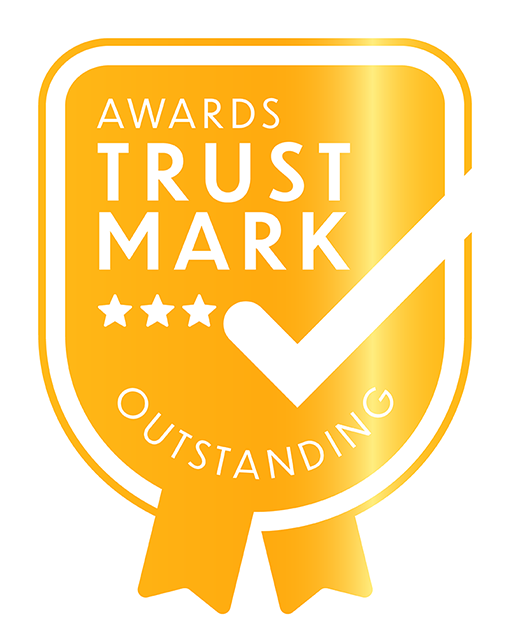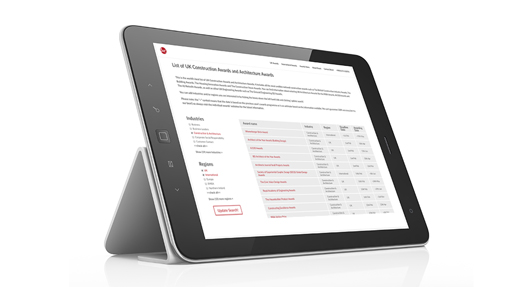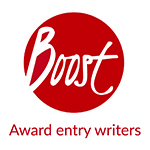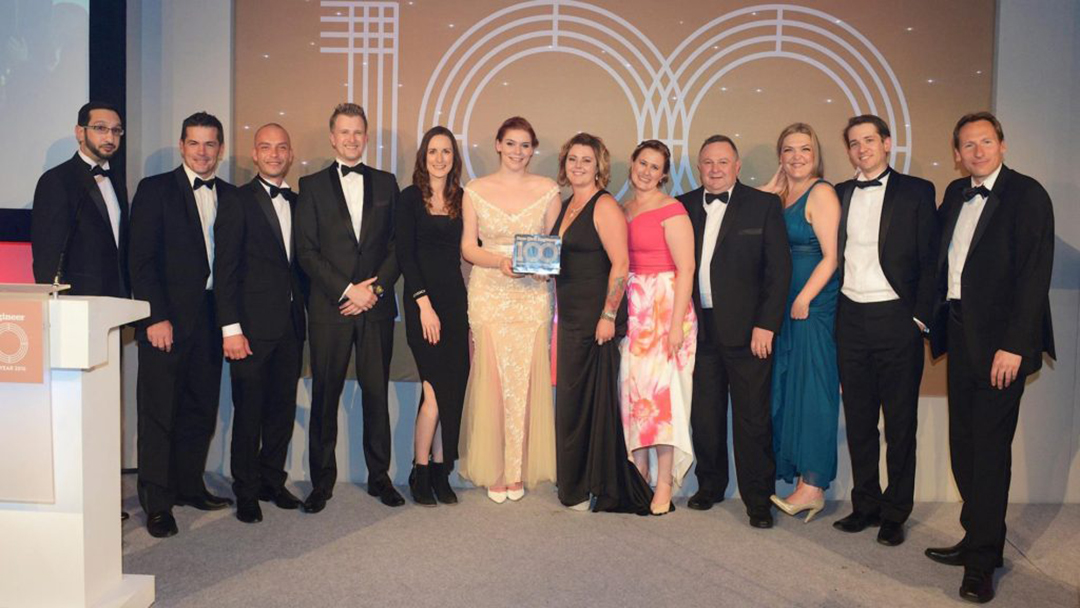Entering Business Awards – The Importance of Data

Amber Campbell
Managing Consultant, Boost
I’m entering awards – why are they asking for my data?
You want to celebrate all the exciting things your business has been doing by entering business awards. But it’s not as simple as writing a story – the entry forms are asking you to evidence your success, namely in the form of company data. So, how do you know that any content or data you share will remain secure? Also, what if older data highlights underperformance? Can you still win an award entry even if you’ve ‘aired your dirty laundry’ so to speak?
A very important component of applying for awards is providing evidence. Unfortunately, awards entries containing claims not reinforced by evidence are unlikely to win. You can’t just tell the judges that you’re the best – you need to prove you actually are! Nominees are expected to ‘show rather than tell’ so every claim you make should be backed up with tangible proof-points.
What data do I need?
Each awards entry will have a different set of requirements when it comes to the data you will need, depending on the award and the category you want to apply for. The first – and arguably most important part of the awards process, is choosing the right award for your business, your target audience, and the story you want to tell. Boost’s awards planning services can help you wade through the growing awards landscape to help you find your perfect match. You can get an idea for just how many awards are out there by looking at our industry-leading awards lists: https://awards-list.co.uk/
Sourcing data can be time-consuming and difficult. Where do you start when a deadline is approaching, and you have 101 other things to be getting on with in the meantime? This is just one of the areas where Boost can help. Our dedicated Evaluation arm can help you source and understand robust qualitative and quantitative evidence. Our experienced team can guide you through the process of finding exactly what information you need to give yourself the best chance of winning, including managing customer and employee surveys. https://boost-evaluation.co.uk/
Below are just some examples of the data you may be required to source, depending on the award you’re entering*:
- Customer experience or satisfaction awards (e.g., the Institute of Customer Service’s UK Customer Satisfaction Awards): You may want to run customer surveys for quantitative data (e.g., Net Promoter Score AKA NPS), or to collate verbatim quotes. Any increase in customer retention or growth in customer numbers can demonstrate that the service you’re offering is making customers choose you every time.
- Awards relating to internal achievements, such as successful training programmes, employee benefits or employee satisfaction (e.g., the CIPD People Management Awards): Employee survey data and verbatim feedback can bring your entries to life. Staff retention, recruitment and internal promotions can also help demonstrate that your company is a great place to work. If you’re looking to celebrate a successful Learning and Development achievement, you should be able to demonstrate how any learning has been practically applied, and its impact on employee performance.

You can’t just tell the judges that you’re the best – you need to prove you actually are! Nominees are expected to ‘show rather than tell’ so every claim you make should be backed up with tangible proof-points.
- In the same thread, Diversity, Equity and Inclusion (DEI) is a theme for many awards (e.g., British Diversity Awards): These might also expect to see employee survey feedback, along with employee data split by key characteristics such as ethnicity, gender, sexual orientation etc. Often you will be asked for your performance vs. target for underserved demographics.
- Marketing awards (e.g., The Drum Marketing Awards): There will often be many layers to the success of a marketing campaign/initiative. This may include initial engagement (often clicks, likes, shares etc.), but will often expect you to be able to link behaviour to a clear, demonstrable call-to-action. This might include an uplift in customers registering for a service or buying a specific product. Many marketing-centric entries will expect you to be able to demonstrate a strong return-on-investment.
- Overall business performance awards (e.g., The British Business Awards): These can vary greatly depending on the specific category you choose. You may be asked for any combination of the above. Just one example is if you’re focused on being a fast-growing business, you’ll want to be able to demonstrate how your customer numbers and revenue have grown within the time parameters set in the entry criteria. Overall, you should be prepared to demonstrate sales and financial success.
The best ways to showcase data include showing a year-on-year increase, before and after an initiative launches, or performance vs. target. As well as evidencing specific initiatives, demonstrating overall success is paramount to producing a strong entry. This will likely include financial data for the whole business. We know it might not always feel relevant to the piece of work you’re showcasing, but if your initiative is successful, this will likely be contributing to overall business performance. Judges will be impressed if you take a holistic view of success, for example a project that helps create more satisfied employees – happy employees will likely perform better, which may in-turn lead to better customer retention or sales, which will contribute to a rise in overall revenue/profit for the business.
*Note this list highlights a few data points – it’s by no means exhaustive. If in doubt, refer to the entry form, the category description, any entry criteria/scoring guidance on the website, or contact the organisers directly for entry advice – they’re usually more than willing to help.
What if older data is less than flattering?
There can be reluctance to include data or elements of a story that show that at one point in time, your business wasn’t performing as it should. There’s concern that the judges may not see this in a flattering light, or you may worry about this information being published and potentially damaging your reputation. We can reassure you, that if you’re talking about a historic issue, which you’ve since rectified – likely by the work you’re showcasing in your entry – you don’t have to shy away from or over-sanitise the truth. In all honesty, showing you have overcome a significant challenge can make your story all the more inspiring. One of the key elements we would look for when helping you produce an entry is the ‘angle’ – why was this work important, and why now? The more necessary the work is, the more impactful the angle is. Just make sure you can evidence the fact that you’ve since improved any areas of weakness.
The rest of this article will talk about how to ensure what you say in your entries isn’t published anywhere without consent – this should reassure you that the right awards won’t risk your reputation by revealing anything you’d rather keep for judges’ eyes only!

“We can reassure you, that if you’re talking about a historic issue, which you’ve since rectified – likely by the work you’re showcasing in your entry – you don’t have to shy away from or over-sanitise the truth.”
I have the data – how can I make sure it’ll be kept safe?
You’ll likely have reservations about submitting your private data to a third-party awards organiser. There’s a good chance that business information is treated as ‘for internal eyes only’, so you might not be confident that your data – and potentially your reputation – will remain protected.
But don’t panic – we’re here to help you navigate this issue.
Firstly, make sure that everyone involved in the submission has given permission to be involved in the award – this includes partners or named clients in any case studies.
Next you need to check what the overall confidentiality policy of the award is – this can often be found on the website or in the FAQ’s section – if not, you should be able to contact the organisation directly and check. Remember, if an award is legitimate, they will be able to tell you what their confidentiality policy is.
Every award is different in its confidentiality policy and management of your data. Most trusted awards will go above and beyond to protect your data, only allowing a trusted team of judges to view your entries.
We’ve highlighted a handful of prominent awards and their confidentiality policies:
Awards run by the hugely popular Awards International group (including the UK Customer Experience Awards, the International Customer Experience Awards, the International Business Excellence Awards, the UK Employee Experience Awards and more!) make their judges sign NDA’s (non-disclosure agreements) before they’re permitted access to your entry. While they may ask to publish case studies in a winner’s e-book, companies will ALWAYS be asked for consent first.
Most databases containing entry information are password-protected and awards are usually very transparent in their management of how data is stored. For example, The Global Good Awards store your data securely within Dropbox, using a password protected Excel document.
Some awards believe that your achievements deserve to be celebrated and will publish a section of your entry, such as a summary or a case study (that you will have been previously made aware of) if you win. The King’s Awards for Enterprise will publish a one-line description of your initiative which will be used in publicity material if your application is successful, but all of the remaining information is only shared with those involved in the assessment process. The Lloyds Bank British Business Excellence Awards will also only publish winning content that you aware of and have agreed to.
Quite often, awards will give you the option to opt out of sections of your entry being published and they will only publish your content with your approval, whether this is written expression or ticking a box within the entry. Awards such as Princess Royal Training Awards, International Business Awards (The Stevies), FStech Awards, Utility Week Awards and Professional Pensions UK Pensions Awards are just a few awards that all consider your preferences before publication and will not publish anything without your prior consent.
Some awards will also make additional considerations to keep your data safe. For example, within the application of Brandon Hall Awards if you have selected ‘Yes’ to granting Brandon Hall Group publishing permission for your entry, but there are still parts of your application you wish not to have published, you have the option to omit these by highlighting them within the form in red. You can also decline to publish any of your entry by ticking ‘No’ when asked for publishing rights, at the point of submission.
If you’re at all concerned and wish to find out more information about the specific criteria for an award including the confidentiality policy, you can check on their website or contact the organisers directly.
How do I recognise organisers’ ‘red flags’?
Unfortunately, there are a wealth of unrecognised, illegitimate awards out there that may not be trusted with your data. Any organiser that refuses to provide clear and transparent advice should be approached with extreme caution. You should always avoid ‘pay-to-win’ or ‘Vanity’ award schemes that exist solely to ensure you part with your money. A key part of our offering at Boost is ensuring the awards that you are entering are right for you, but are also legitimate, recognised and secure.
For an extra sense of security, you may see that many well-known schemes have an ‘Awards Trustmark’ . An ‘Awards Trustmark’ is a well-known not-for-profit accreditation scheme created by the Independent Awards Standards Council (and co-founded by Boost Managing Director, Chris Robinson). If you see an ‘Awards Trustmark’ on an awards site, you can be sure the scheme in question has been vetted to a high standard by a team of impartial individuals. Part of this process is ensuring the award has a strong confidentiality policy in place, and no data or content will be shared without entrants’ permission. Visit https://awardstrustmark.org/ for more details.
I’m onboard, but my team aren’t – how do I convince them?
Once you’ve done the due diligence, it’s now time to source the data. But what if the gatekeepers of the data within your business are still reluctant to share it for the purpose of an awards entry?
Here are some top tips on managing the data challenge:
Share the award’s confidentiality policy with them. Data and legal teams may also want to check the privacy policy on the website for any third-party affiliates or if the award is organised by a publication. For these details, there is usually a link to the privacy policy in the footer of the website or in the T’s & C’s section. If you have any concerns, simply contact the award organisers, and ask.
Stress the importance of evidencing the award – if you can’t back up the claims made in your entry and demonstrate success in a tangible way, you run the risk of not even shortlisting, let alone winning!
It’s also worth considering if there is any public data you can use? Consider if your, or your clients’ companies publish annual performance reports, as these can be a rich repository of growth/financial data. If these have already been published, stakeholders won’t have to worry about the privacy of the data in question.
Also consider if a survey might be useful, especially for awards where the story is strong, but the data is lacking. You can talk to our Evaluation experts to better understand how we might be able to help.
I’d like Boost to help me, but how will you protect my data?
We regularly sign non-disclosure agreements with clients and are always happy to do so. Whether we sign one or not, we will treat all information provided as confidential and won’t share it outside the Boost team. We also won’t publish the fact that we work with you on our website or in marketing communications of any sort without your permission. Confidentiality is part of our detailed ethics policy which outlines the ways in which integrity is a cornerstone of our business. While you may see that we have relationships with well-known awards organisers, we don’t run our own schemes – this means we’ll never try to convince you to enter awards where we benefit more than you!
What now?
Hopefully this article has helped with any concerns you have regarding sharing data when submitting award entries. We’ve been helping businesses enter awards since 2006 and we are more experienced than any other agency in the world when it comes to all aspects of awards.
If you need help planning which awards to enter, writing your award entry or evidencing your entry by sourcing the appropriate data I would be happy to give you a call to help you double check your chances of success and explain our pricing options. You can contact the team via our contact form or me personally using amber.campbell@boost-awards.co.uk.
I look forward to hearing from you – let’s win some awards!
Amber.
Awards List
Please take a look on our UK Awards List and International Awards List websites, our unique free resources where you can find over 5,000 awards, organised by both industries and regions.
Boost – a helping hand entering awards
Boost is the world’s first and largest award entry consultancy, having helped clients, from SMEs to Multinationals, win over 2,000 credible business awards. Increase your chances of success significantly – call Boost on +44(0)1273 258703 today for a no-obligation chat about awards.
(C) This article was written by Amber Campbell and is the intellectual property of award entry consultants Boost Awards.
Entering Business Awards – The Importance of Data

Amber Campbell
Managing Consultant, Boost
I’m entering awards – why are they asking for my data?
You want to celebrate all the exciting things your business has been doing by entering business awards. But it’s not as simple as writing a story – the entry forms are asking you to evidence your success, namely in the form of company data. So, how do you know that any content or data you share will remain secure? Also, what if older data highlights underperformance? Can you still win an award entry even if you’ve ‘aired your dirty laundry’ so to speak?
A very important component of applying for awards is providing evidence. Unfortunately, awards entries containing claims not reinforced by evidence are unlikely to win. You can’t just tell the judges that you’re the best – you need to prove you actually are! Nominees are expected to ‘show rather than tell’ so every claim you make should be backed up with tangible proof-points.
What data do I need?
Each awards entry will have a different set of requirements when it comes to the data you will need, depending on the award and the category you want to apply for. The first – and arguably most important part of the awards process, is choosing the right award for your business, your target audience, and the story you want to tell. Boost’s awards planning services can help you wade through the growing awards landscape to help you find your perfect match. You can get an idea for just how many awards are out there by looking at our industry-leading awards lists: https://awards-list.co.uk/
Sourcing data can be time-consuming and difficult. Where do you start when a deadline is approaching, and you have 101 other things to be getting on with in the meantime? This is just one of the areas where Boost can help. Our dedicated Evaluation arm can help you source and understand robust qualitative and quantitative evidence. Our experienced team can guide you through the process of finding exactly what information you need to give yourself the best chance of winning, including managing customer and employee surveys. https://boost-evaluation.co.uk/
Below are just some examples of the data you may be required to source, depending on the award you’re entering*:
- Customer experience or satisfaction awards (e.g., the Institute of Customer Service’s UK Customer Satisfaction Awards): You may want to run customer surveys for quantitative data (e.g., Net Promoter Score AKA NPS), or to collate verbatim quotes. Any increase in customer retention or growth in customer numbers can demonstrate that the service you’re offering is making customers choose you every time.
- Awards relating to internal achievements, such as successful training programmes, employee benefits or employee satisfaction (e.g., the CIPD People Management Awards): Employee survey data and verbatim feedback can bring your entries to life. Staff retention, recruitment and internal promotions can also help demonstrate that your company is a great place to work. If you’re looking to celebrate a successful Learning and Development achievement, you should be able to demonstrate how any learning has been practically applied, and its impact on employee performance.

You can’t just tell the judges that you’re the best – you need to prove you actually are! Nominees are expected to ‘show rather than tell’ so every claim you make should be backed up with tangible proof-points.
- In the same thread, Diversity, Equity and Inclusion (DEI) is a theme for many awards (e.g., British Diversity Awards): These might also expect to see employee survey feedback, along with employee data split by key characteristics such as ethnicity, gender, sexual orientation etc. Often you will be asked for your performance vs. target for underserved demographics.
- Marketing awards (e.g., The Drum Marketing Awards): There will often be many layers to the success of a marketing campaign/initiative. This may include initial engagement (often clicks, likes, shares etc.), but will often expect you to be able to link behaviour to a clear, demonstrable call-to-action. This might include an uplift in customers registering for a service or buying a specific product. Many marketing-centric entries will expect you to be able to demonstrate a strong return-on-investment.
- Overall business performance awards (e.g., The British Business Awards): These can vary greatly depending on the specific category you choose. You may be asked for any combination of the above. Just one example is if you’re focused on being a fast-growing business, you’ll want to be able to demonstrate how your customer numbers and revenue have grown within the time parameters set in the entry criteria. Overall, you should be prepared to demonstrate sales and financial success.
The best ways to showcase data include showing a year-on-year increase, before and after an initiative launches, or performance vs. target. As well as evidencing specific initiatives, demonstrating overall success is paramount to producing a strong entry. This will likely include financial data for the whole business. We know it might not always feel relevant to the piece of work you’re showcasing, but if your initiative is successful, this will likely be contributing to overall business performance. Judges will be impressed if you take a holistic view of success, for example a project that helps create more satisfied employees – happy employees will likely perform better, which may in-turn lead to better customer retention or sales, which will contribute to a rise in overall revenue/profit for the business.
*Note this list highlights a few data points – it’s by no means exhaustive. If in doubt, refer to the entry form, the category description, any entry criteria/scoring guidance on the website, or contact the organisers directly for entry advice – they’re usually more than willing to help.
What if older data is less than flattering?
There can be reluctance to include data or elements of a story that show that at one point in time, your business wasn’t performing as it should. There’s concern that the judges may not see this in a flattering light, or you may worry about this information being published and potentially damaging your reputation. We can reassure you, that if you’re talking about a historic issue, which you’ve since rectified – likely by the work you’re showcasing in your entry – you don’t have to shy away from or over-sanitise the truth. In all honesty, showing you have overcome a significant challenge can make your story all the more inspiring. One of the key elements we would look for when helping you produce an entry is the ‘angle’ – why was this work important, and why now? The more necessary the work is, the more impactful the angle is. Just make sure you can evidence the fact that you’ve since improved any areas of weakness.
The rest of this article will talk about how to ensure what you say in your entries isn’t published anywhere without consent – this should reassure you that the right awards won’t risk your reputation by revealing anything you’d rather keep for judges’ eyes only!

“We can reassure you, that if you’re talking about a historic issue, which you’ve since rectified – likely by the work you’re showcasing in your entry – you don’t have to shy away from or over-sanitise the truth.”
I have the data – how can I make sure it’ll be kept safe?
You’ll likely have reservations about submitting your private data to a third-party awards organiser. There’s a good chance that business information is treated as ‘for internal eyes only’, so you might not be confident that your data – and potentially your reputation – will remain protected.
But don’t panic – we’re here to help you navigate this issue.
Firstly, make sure that everyone involved in the submission has given permission to be involved in the award – this includes partners or named clients in any case studies.
Next you need to check what the overall confidentiality policy of the award is – this can often be found on the website or in the FAQ’s section – if not, you should be able to contact the organisation directly and check. Remember, if an award is legitimate, they will be able to tell you what their confidentiality policy is.
Every award is different in its confidentiality policy and management of your data. Most trusted awards will go above and beyond to protect your data, only allowing a trusted team of judges to view your entries.
We’ve highlighted a handful of prominent awards and their confidentiality policies:
Awards run by the hugely popular Awards International group (including the UK Customer Experience Awards, the International Customer Experience Awards, the International Business Excellence Awards, the UK Employee Experience Awards and more!) make their judges sign NDA’s (non-disclosure agreements) before they’re permitted access to your entry. While they may ask to publish case studies in a winner’s e-book, companies will ALWAYS be asked for consent first.
Most databases containing entry information are password-protected and awards are usually very transparent in their management of how data is stored. For example, The Global Good Awards store your data securely within Dropbox, using a password protected Excel document.
Some awards believe that your achievements deserve to be celebrated and will publish a section of your entry, such as a summary or a case study (that you will have been previously made aware of) if you win. The King’s Awards for Enterprise will publish a one-line description of your initiative which will be used in publicity material if your application is successful, but all of the remaining information is only shared with those involved in the assessment process. The Lloyds Bank British Business Excellence Awards will also only publish winning content that you aware of and have agreed to.
Quite often, awards will give you the option to opt out of sections of your entry being published and they will only publish your content with your approval, whether this is written expression or ticking a box within the entry. Awards such as Princess Royal Training Awards, International Business Awards (The Stevies), FStech Awards, Utility Week Awards and Professional Pensions UK Pensions Awards are just a few awards that all consider your preferences before publication and will not publish anything without your prior consent.
Some awards will also make additional considerations to keep your data safe. For example, within the application of Brandon Hall Awards if you have selected ‘Yes’ to granting Brandon Hall Group publishing permission for your entry, but there are still parts of your application you wish not to have published, you have the option to omit these by highlighting them within the form in red. You can also decline to publish any of your entry by ticking ‘No’ when asked for publishing rights, at the point of submission.
If you’re at all concerned and wish to find out more information about the specific criteria for an award including the confidentiality policy, you can check on their website or contact the organisers directly.
How do I recognise organisers’ ‘red flags’?
Unfortunately, there are a wealth of unrecognised, illegitimate awards out there that may not be trusted with your data. Any organiser that refuses to provide clear and transparent advice should be approached with extreme caution. You should always avoid ‘pay-to-win’ or ‘Vanity’ award schemes that exist solely to ensure you part with your money. A key part of our offering at Boost is ensuring the awards that you are entering are right for you, but are also legitimate, recognised and secure.
For an extra sense of security, you may see that many well-known schemes have an ‘Awards Trustmark’ . An ‘Awards Trustmark’ is a well-known not-for-profit accreditation scheme created by the Independent Awards Standards Council (and co-founded by Boost Managing Director, Chris Robinson). If you see an ‘Awards Trustmark’ on an awards site, you can be sure the scheme in question has been vetted to a high standard by a team of impartial individuals. Part of this process is ensuring the award has a strong confidentiality policy in place, and no data or content will be shared without entrants’ permission. Visit https://awardstrustmark.org/ for more details.
I’m onboard, but my team aren’t – how do I convince them?
Once you’ve done the due diligence, it’s now time to source the data. But what if the gatekeepers of the data within your business are still reluctant to share it for the purpose of an awards entry?
Here are some top tips on managing the data challenge:
Share the award’s confidentiality policy with them. Data and legal teams may also want to check the privacy policy on the website for any third-party affiliates or if the award is organised by a publication. For these details, there is usually a link to the privacy policy in the footer of the website or in the T’s & C’s section. If you have any concerns, simply contact the award organisers, and ask.
Stress the importance of evidencing the award – if you can’t back up the claims made in your entry and demonstrate success in a tangible way, you run the risk of not even shortlisting, let alone winning!
It’s also worth considering if there is any public data you can use? Consider if your, or your clients’ companies publish annual performance reports, as these can be a rich repository of growth/financial data. If these have already been published, stakeholders won’t have to worry about the privacy of the data in question.
Also consider if a survey might be useful, especially for awards where the story is strong, but the data is lacking. You can talk to our Evaluation experts to better understand how we might be able to help.
I’d like Boost to help me, but how will you protect my data?
We regularly sign non-disclosure agreements with clients and are always happy to do so. Whether we sign one or not, we will treat all information provided as confidential and won’t share it outside the Boost team. We also won’t publish the fact that we work with you on our website or in marketing communications of any sort without your permission. Confidentiality is part of our detailed ethics policy which outlines the ways in which integrity is a cornerstone of our business. While you may see that we have relationships with well-known awards organisers, we don’t run our own schemes – this means we’ll never try to convince you to enter awards where we benefit more than you!
What now?
Hopefully this article has helped with any concerns you have regarding sharing data when submitting award entries. We’ve been helping businesses enter awards since 2006 and we are more experienced than any other agency in the world when it comes to all aspects of awards.
If you need help planning which awards to enter, writing your award entry or evidencing your entry by sourcing the appropriate data I would be happy to give you a call to help you double check your chances of success and explain our pricing options. You can contact the team via our contact form or me personally using amber.campbell@boost-awards.co.uk.
I look forward to hearing from you – let’s win some awards!
Amber.
Awards List
Please take a look on our UK Awards List and International Awards List websites, our unique free resources where you can find over 5,000 awards, organised by both industries and regions.
Boost – a helping hand entering awards
Boost is the world’s first and largest award entry consultancy, having helped clients, from SMEs to Multinationals, win over 2,000 credible business awards. Increase your chances of success significantly – call Boost on +44(0)1273 258703 today for a no-obligation chat about awards.
(C) This article was written by Amber Campbell and is the intellectual property of award entry consultants Boost Awards.
Looking for awards to enter?
Sign up for our free email deadline reminders to make sure you never miss an awards deadline. Every month you will receive a comprehensive list of upcoming awards deadlines (in the next two months) organised by industry sector.






